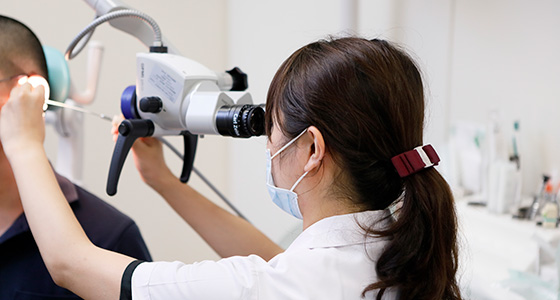- HOME
- Department
- Otorhinolaryngology – Head & Neck Surgery
Otorhinolaryngology – Head & Neck Surgery

(1) Overview
The Department of Otolaryngology – Head and Neck Surgery handles a wide range of conditions, from commonly known illnesses such as otitis media, allergic rhinitis, and tonsillitis, to both benign and malignant tumors in the head and neck region. Specifically, the department provides diagnosis and treatment for the following conditions:
- Ear disorders: hearing loss, otitis media, vertigo, etc.
- Nasal disorders: chronic sinusitis, allergic rhinitis, etc.
- Throat and laryngeal disorders: tonsillitis, vocal cord polyps, etc.
- Head and neck tumors (both benign and malignant)
- Sleep apnea syndrome
- Facial nerve paralysis
(2) Policy
It is known that the degree of malignancy of head and neck cancer cannot be completely determined based on appearance and imaging tests alone. For this reason, the department aims for personalized treatment cautiously proceeding with treatment based on clear scientific evidence in accordance with the characteristics and condition of the tumor.
Among these, our department places the greatest emphasis on the diagnosis and treatment of head and neck tumors (cancers).
It is well known that the malignancy of head and neck cancers cannot be fully determined by appearance or imaging tests alone.
Therefore, our department carefully proceeds with treatment based on clear scientific evidence, aiming to provide personalized, tailor-made care according to the nature and condition of each tumor.
(3) Our Strengths
Efforts to Minimize the Impact of Surgery on Daily Life
At our department, we often receive referrals from other medical institutions for patients requiring surgery, and we perform over 300 surgical procedures annually (based on surgical records from the central operating room between January 1, 2024, and December 31, 2024).
For surgeries that require hospitalization, we aim to minimize the length of stay. For example, patients undergoing surgery for benign head and neck tumors can typically be discharged after approximately four nights. In cases such as nasal or sinus surgery or vocal cord polyp removal, we strive for the shortest possible hospital stay, depending on the specifics of each case.
We also offer admission and discharge services on Saturdays and Sundays, ensuring that even patients with work commitments can receive care in a way that accommodates their schedules.
Choosing the Least Invasive Surgical Methods Whenever Possible
Malignant tumors of the head and neck include pharyngeal cancer, laryngeal cancer, nasal and paranasal sinus cancer, oral cancer, salivary gland cancer, and thyroid cancer.
For relatively early-stage laryngeal, oropharyngeal, and hypopharyngeal cancers, our department utilizes a technique called transoral tumor resection whenever possible. This procedure allows tumors that previously required external incisions to be removed through the mouth using an endoscope. Since 2023, we have also introduced robot-assisted transoral surgery, further enhancing our minimally invasive treatment options. Through these methods, we aim to achieve curative outcomes while minimizing the physical burden on our patients.
In cases of advanced laryngeal cancer or recurrence after radiation therapy—where total laryngectomy has traditionally been required—we now strive, when feasible, to use transoral surgery, partial laryngectomy, or near-total laryngectomy. These approaches help preserve the patient’s voice.
Of course, for more advanced cases, we also actively perform reconstructive surgery using free tissue transfer to restore function and appearance.
Efforts to Ensure the Safe Performance of Endoscopic Endonasal Sinus Surgery
For cases of chronic sinusitis (commonly known as “sinus infection”) that do not improve with antibiotic treatment or are moderate to severe in severity, we recommend surgical intervention. In most such cases, our department performs a procedure called Endoscopic Sinus Surgery (ESS). This surgery can be performed on both sides of the sinuses simultaneously and offers several advantages, including a shorter hospital stay and reduced postoperative pain and swelling.
Today, many hospitals use high-definition endoscopic systems, which allow surgeons to clearly visualize the inside of the nasal passages during the procedure. At our department, to further enhance safety, we routinely use a navigation system for all endoscopic sinus surgeries. This technology provides real-time guidance, helping ensure precise and secure surgical outcomes.
Message for Our Patients
The areas where head and neck cancers occur often play essential roles in vital functions such as speaking, swallowing, and breathing. These regions are also highly susceptible to changes in appearance due to treatment.
If cancer is detected at an early stage, not only is it more likely to be cured, but important functions can often be preserved and aesthetic outcomes maintained. For this reason, we strongly encourage early consultation if you experience any of the following symptoms:
- Hoarseness of voice
- Pain when swallowing
- Swelling in the neck
- Difficulty swallowing solid foods
- Double vision